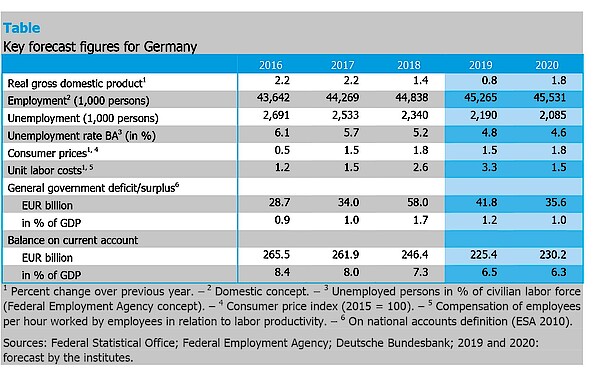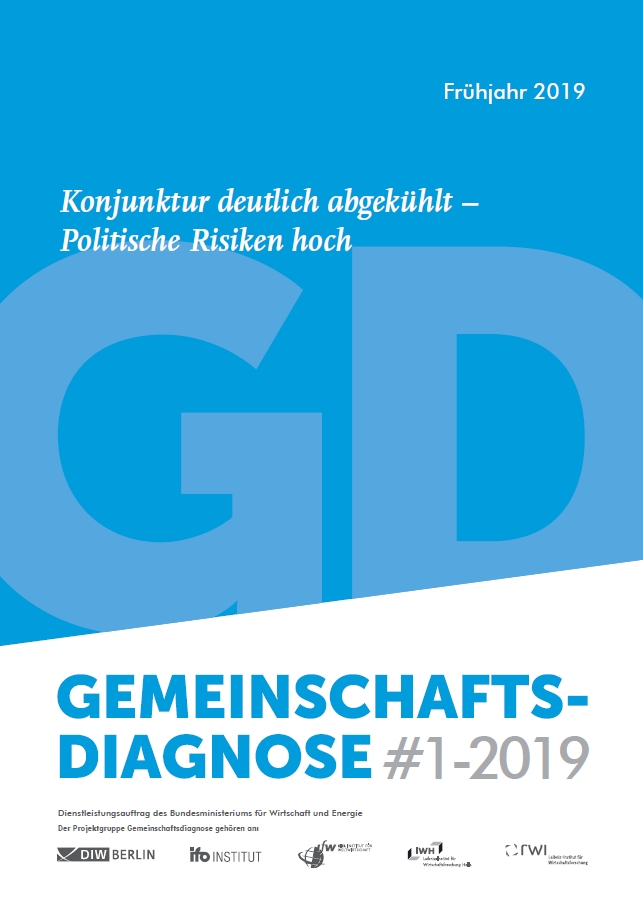Joint Economic Forecast Spring 2019: Significant cooling of the economy – Political risks high
"The long-term upswing of the German economy has come to an end," says Oliver Holtemöller, head of the Department of Macroeconomics and Vice President of the Halle Institute for Economic Research (IWH), which coordinated this spring’s report. The report concludes that political risks have further clouded the global economic environment. However, the economic slump in the second half of 2018 is due primarily to obstacles to production in industry. "We still consider the chance of a pronounced recession to be slight," Holtemöller adds. The forecast was completed as of March 29, 2019, when it still seemed that a hard Brexit would be avoided. This has now become less likely, but is still possible. However, if a no-deal Brexit occurs, economic growth this year and the next is likely to be significantly lower than indicated in this forecast.

Employment growth is expected to lose momentum, but the number of people in employment will rise from 45.3 million this year to 45.5 million next year. Over the same period, the number of registered unemployed people will decline from 2.2 million to 2.1 million. This will bring the unemployment rate down from 4.8% to 4.6%. Consumer price inflation is projected to rise from an average of 1.5% this year to 1.8% in 2020. Domestic inflation will increase. The institutes expect the government to see significant fiscal surpluses over the entire forecast period, although they will shrink considerably: while last year’s surplus reached a record high of 58 billion euros, this year’s is likely to be down to 41.8 billion euros and next year’s, 35.6 billion euros.
In view of the economic cooldown, fiscal policy should let the automatic stabilisers do their job. It should not seek to consciously save for the sake of Germany’s "black zero"; after all, both the German debt brake and the European fiscal policy framework explicitly permit cyclical deficits.
The risks for the German and the global economy have grown since autumn 2018. At the international level, there are threats posed by the trade dispute between the US and China and by the still unresolved Brexit process. At the national level, the economic situation is weighed down by supply bottlenecks, a shortage of skilled workers, and difficulties in the automotive industry.
The Joint Economic Forecast was prepared by DIW (Berlin), the ifo Institute (Munich), IfW (Kiel), IWH (Halle), and RWI (Essen).
Full-length version of the report
Joint Economic Forecast Project Group: Significant Cooling of the Economy – Political Risks High, Spring 2019. Halle (Saale) 2019.
The full-length version of the report (in German language) will be available on the IWH website and at www.gemeinschaftsdiagnose.de/category/gutachten/.
About the Joint Economic Forecast
The Joint Economic Forecast is published twice a year on behalf of the German Federal Ministry for Economic Affairs and Energy. The following institutes participated in the spring 2019 report:
- German Institute for Economic Research (DIW Berlin)
- ifo Institute – Leibniz Institute for Economic Research at the University of Munich
in cooperation with the KOF Swiss Economic Institute at ETH Zurich - Kiel Institute for the World Economy (IfW Kiel)
- Halle Institute for Economic Research (IWH) – Member of the Leibniz Association
- RWI – Leibniz Institute for Economic Research in cooperation with the Institute for Advanced Studies Vienna
Scientific Contacts
Dr. Claus Michelsen
German Institute for Economic Research (DIW Berlin)
Tel +49 30 89789 458
CMichelsen@diw.de
Professor Dr. Timo Wollmershäuser
ifo Institute – Leibniz Institute for Economic Research at the University of Munich
Tel +49 89 9224 1406
Wollmershaeuser@ifo.de
Professor Dr. Stefan Kooths
Kiel Institute for the World Economy (IfW Kiel)
Tel +49 341 8814 579 oder +49 30 2067 9664
Stefan.Kooths@ifw-kiel.de
Professor Dr. Oliver Holtemöller
Halle Institute for Economic Research (IWH) – Member of the Leibniz Association
Tel +49 345 7753 800
Oliver.Holtemoeller@iwh-halle.de
Professor Dr. Roland Döhrn
RWI – Leibniz Institute for Economic Research
Tel +49 201 8149 262
Roland.Doehrn@rwi-essen.de
Whom to contact
For Researchers

Vice President Department Head
If you have any further questions please contact me.
+49 345 7753-800 Request per E-MailFor Journalists

Internal and External Communications
If you have any further questions please contact me.
+49 345 7753-832 Request per E-MailIWH list of experts
The IWH list of experts provides an overview of IWH research topics and the researchers and scientists in these areas. The relevant experts for the topics listed there can be reached for questions as usual through the IWH Press Office.
Related Publications

Significant Cooling of the Economy – Political Risks High: Joint Economic Forecast Spring 2019
in: Dienstleistungsauftrag des Bundesministeriums für Wirtschaft und Energie, 1, 2019
Abstract
Die Konjunktur in Deutschland hat sich seit Mitte des Jahres 2018 merklich abgekühlt. Der langjährige Aufschwung ist damit offenbar zu einem Ende gekommen. Die schwächere Dynamik wurde sowohl vom internationalen Umfeld als auch von branchenspezifischen Ereignissen ausgelöst. Die weltwirtschaftlichen Rahmenbedingungen haben sich – auch aufgrund politischer Risiken – eingetrübt, und das Verarbeitende Gewerbe hat mit Produktionshemmnissen zu kämpfen. Die deutsche Wirtschaft durchläuft nunmehr eine Abkühlungsphase, in der die gesamtwirtschaftliche Überauslastung zurückgeht. Die Institute erwarten für das Jahr 2019 nur noch ein Wirtschaftswachstum von 0,8% und damit mehr als einen Prozentpunkt weniger als noch im Herbst 2018. Die Gefahr einer ausgeprägten Rezession mit negativen Veränderungsraten des Bruttoinlandsprodukts über mehrere Quartale halten die Institute jedoch bislang für gering, jedenfalls solange sich die politischen Risiken nicht weiter zuspitzen. Für das Jahr 2020 bestätigen die Institute ihre Prognose aus dem vergangenen Herbst: Das Bruttoinlandsprodukt dürfte im Jahr 2020 um 1,8% zunehmen.



